Matthew Yglesias's Blog, page 2431
February 4, 2011
Better Schools For Everyone
I found there to be something very odd about the tone of both the Hess/West/Petrilli contribution to Education Next's 10th anniversary issue and also the Peterson/Finn/Kanstoroom piece that allegedly represents "the other side of the debate." But I thought that both sets of authors agreed on one important issue.
Here's the Hess/West/Petrilli version of the point:
For the past decade, school reform has been primarily about "closing achievement gaps" by boosting math and reading proficiency and graduation rates, among black, Latino, and poor students. "Conservative" notions of accountability have been linked to old-school liberal conceptions of "social justice." This is all admirable. At the same time, this emphasis signals to the vast majority of American parents that school reform isn't about helping their kids. And, given that only about one household in five even contains school-age children, 80 percent of households are being told that extra dollars and energy should be redirected into urban centers simply because it's the right thing to do.
And here's the Peterson/Kanstoroom/Finn version:
>It's true that the public thinks the country's schools are doing poorly. Only 18 percent gave them an A or a B grade. Yet a clear majority thought their own elementary and middle schools were doing quite well, with 65 percent conferring honors grades on their elementary school and 55 percent awarding such marks to their middle school. The prevailing view seems to be that "schools are bad except for those in my neighborhood. These do not need changing—and they are the schools I really care about."
To put this point my own way, apocalyptic talk about "failing" schools and intense elite focus on the problems of the least-privileged students tends to obscure the more banal reality that most schools are non-optimal in lots of ways. And this is bad. It's bad even though most middle class white kids do basically okay. It's bad not just because many kids aren't middle class white kids. It's bad, fundamentally, because in the aggregate the K-12 education system in the United States is really big. Its comprised of a millions-strong workforce, countless buildings and buses, lots of money, etc. and consequently its various inefficiencies and pathologies are, in the aggregate, a big wastage of national potential.
It's worth noting that an exaggerated view of how terrible "the public schools" are goes hand in hand with exaggerated complacency about one's own local school. If you walked around thinking that the average American male was 5'3″ then you'd also walk around thinking that you and your friends and neighbors are really tall. It would actually be more politically useful to have people more focused on the modest but real problems in their own local schools than have them morbidly obsessed with semi-mythical tales of a "broken" school system that they're fortunate not to be stuck in.


February 3, 2011
Endgame
They don't have to be:
— If Newt Gingrich is "a charismatic speaker and able debater" then why was he so unpopular when he led the House GOP?
— The ineligible to vote under-18 demographic must be heavily minority.
— I always like it when Josh Marshall does substantive writing.
Dressy Bessy, "Electrified".


Why Subsidize Small Farmers?
Mark Bittman's transforming himself into a full-time opinion writer instead of doing his "minimalist" cooking column, and I think his initial manifesto has a lot of good ideas. But this one strikes me as bad and it's noteworthy that he doesn't even really seem to try to argue for it:
Begin subsidies to those who produce and sell actual food for direct consumption. Small farmers and their employees need to make living wages.
Now the context here is a larger program in which we've already ended corn and soybean subsidies, begun to tax unhealthy foods, and outlawed environmentally destructive CAFOs. So the hypothesis is that we're aligning the incentives correctly—farmers are farming food, for people, not subsidies. Taxes encourage people to buy healthy food and regulations dissuade farmers from unsustainable practices. Under those circumstances, why on earth should the government add on extra subsidies for farms that are small?
It seems to me that what we want from our farms is farms that are as efficient as possible in their use of resources like land, labor, water, etc. You don't want to encourage a kind of narrow economic efficiency that simply reflects environmental destruction. And of course if a smaller farm can produce a better product, that's excellent for them and they should find a market niche on that basis. But there's no more reason for public policy to put its thumb on the scale of smallness than to put its thumb on the scale in favor of corn. Personally, I like going to the farmer's market when the weather's nice and so do a lot of other people. In the more prosperous America of tomorrow, I bet even more people will enjoy paying a small premium for the premium wares available at such markets. And if we ever managed to curtail subsidies to agribusiness corn and soy producers, I bet those farmers would be in even better shape. But what's the case for smallness as such supposed to be?


Marriage On The Decline
Tons of new Census data out today, some of it summarized by the New York Times alongside some amusing cartoons. I thought this series was interesting:
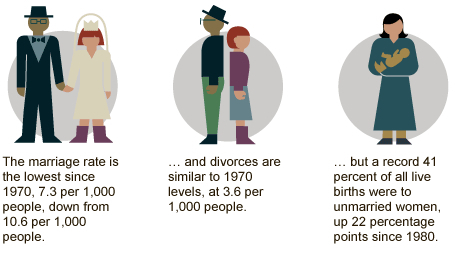
Apparently gay marriage in a handful of states has already ruined things.
Joking aside, I'm not sure people always take due account of this sort of thing when looking at trends in recent American history. I'm not the type to get nostalgic about the good old days of patriarchy, but the fact of the matter is that from a strictly economic point of view a married couple household is a much more efficient arrangement than the one-adult alternative. So if you look at any kind of strictly economic trend, part of what you're seeing is a growing tendency for lower-efficiency, but possibly higher happiness, living arrangements—divorce, extended singledom, etc.


Ayaan Hirsi Ali On Egypt

Ex-Muslim Ayaan Hirsi Ali warns us to be very afraid of the Muslim Brotherhood coming to power in Egypt. And maybe she's right. But it's difficult to take her word for it. After all, she thinks that Islam in general needs to be extirpated from the planet:
But surely she must see, I counter, that the majority of British Muslims are moderates? Sitting in her publisher's office in an elegant grey-flannel trouser suit and pearl earrings, she fixes me with her lucid brown eyes. "If the majority are moderates, why did the Muslim community never take to the streets to abhor the 7/7 bombers? Why is it that the only time we see Muslims protesting en masse is when Islam is allegedly insulted, like with the Danish cartoons, or the Pope's comments?"
"I'll tell you why: because Islam is the new fascism. Just like Nazism started with Hitler's vision, the Islamic vision is a caliphate – a society ruled by Sharia law – in which women who have sex before marriage are stoned to death, homosexuals are beaten, and apostates like me are killed. Sharia law is as inimical to liberal democracy as Nazism. Young Muslims need to be persuaded that the vision of the Prophet Mohammed is a bad one, and you aren't going to get that in Islamic faith schools."
That's not really a worldview that leaves you with a lot of practical policy options vis-à-vis Egypt. I mean, it's a great big country full of Muslims. Maybe in 50 or 100 years, folks like Ali and I who don't believe in God will persuade Egyptians that we're right. But in the short to medium term, there's no real alternative to Egypt being governed predominantly by avowed Muslims. And if Islam as such is "the new fascism" then what's the point in worrying about the Muslim Brotherhood in particular?


With Inflation Low and Unemployment High, Will The Fed Step On The Gas?
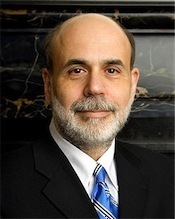
Federal Reserve Chairman Ben Bernanke spoke today:
In sum, although economic growth will probably increase this year, we expect the unemployment rate to remain stubbornly above, and inflation to remain persistently below, the levels that Federal Reserve policymakers have judged to be consistent over the longer term with our mandate from the Congress to foster maximum employment and price stability. Under such conditions, the Federal Reserve would typically ease monetary policy by reducing the target for its short-term policy interest rate, the federal funds rate. However, the target range for the funds rate has been near zero since December 2008, and the Federal Reserve has indicated that economic conditions are likely to warrant an exceptionally low target rate for an extended period. As a result, for the past two years we have been using alternative tools to provide additional monetary accommodation.
Bernanke later says that in his view QE2 has been successful at pushing things in the right direction, a conclusion strongly supported by the ongoing correlation between inflation expectations and asset prices. Karl Smith is cheered.
I'm a bit less cheered.
The good news in the speech is that it indicates that Ben Bernanke has the same analysis of the situation that I have and that Bernanke had when talking about Japan in 2003. He thinks that in a depressed economy with lots of excess labor and low inflation that expansionary monetary policy can boost real output. My concern is that this always seems to have been the view of Ben Bernanke the economic analyst. But Ben Bernanke the politician has always been much less aggressive in what he delivers than what Ben Bernanke the analyst's diagnosis would suggest. Is he outvoted on the FOMC? If so, he hasn't done a very good job of communicating to the White House or Congress the need to send him some reinforcements.
My fear is that something about the political economy of the modern day "independent" central bank pushes it toward a deflationary bias. After all, it's not just the Fed, it's the Bank of Japan and the ECB, too.


Population Density in the Caribbean
The island of Providenciales struck me as pretty sparsely populated for being the most built-up island of the Turks & Caicos Islands so I looked it up and, indeed, TCI has a fairly low population density for a country that doesn't feature vast yawning wilderness or anything. I wondered if that was typical of the region, and it turns out not to be:
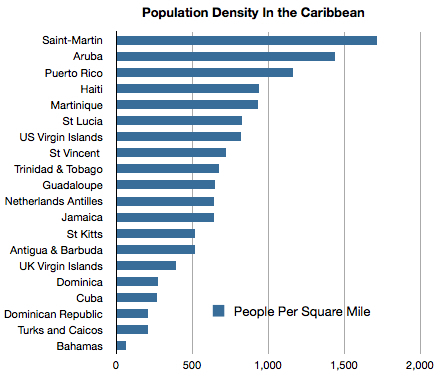
For comparison's sake, St Martin is like Taiwan or the Palestinian Territories—very dense, denser than any American state. Puerto Rico is about as dense as New Jersey, Lebanon, or South Korea. Jamaica is more like Germany, and Cuba is sparser than Pennsylvania but denser than California. The Bahamas are way down near the bottom, presumably because it's an archipelago rather than an island, but still denser than 18 states.
My assumption is that for islands there would be major advantages to obtaining very high density. It's extremely useful to have decent road and rail links to a major container port, but you probably wouldn't build such a port on an island unless a ton of people lived there.


17th Century Industrial Policy

Mark Kishlansky's A Monarchy Transformed offers the following on Stuart England's efforts to move up the value chain:
In truth, schemes like the Cockayne Project, in which a syndicate of London merchants was given the right to export coloured cloth while the export of undyed cloth was inhibited, were unmitigated disasters.
What's more, at the time there was no special legal distinction between a patent and the king's general power to create monopolies.
We also learn this about occupational licensing:
He would rather 'his child were baptized by an ape as by a woman' he concluded in dismissing the custom of allowing midwives to baptize dying infants, which many, including the King, believed was a cover for witches to steal babies for satanic rituals.
Any time you read a well-written history of any subject you don't know much about, you wind up learning surprising things and getting some interesting ideas.


Inflation and Stock Prices
Paul Krugman and Scott Sumner tout a new David Glassner paper showing a tight post-crash correlation between inflation expectations and the S&P 500 which they think illustrates the case that a demand shortfall is at the root of our economic problems:
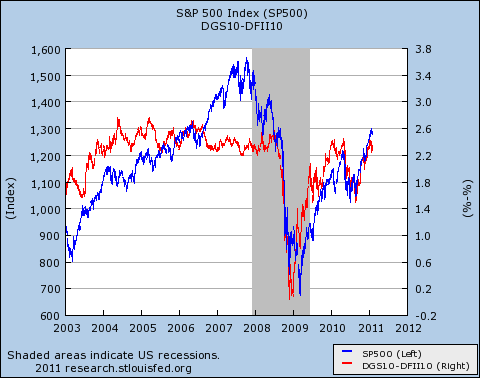
Kevin Drum likes the conclusion but says "Sadly, neither Glasner, Sumner, nor Krugman explain in terms someone like me can understand why this correlation implies that aggregate demand is what's behind our economic woes." Let me take a stab at it.
If low aggregate demand is at the root of our problems, then we should be able to solve our problem through helicopter drops. Mail envelops full of dollar bills to each American household, and spending will increase. The increased spending will induce firms to increase the pace of activity, which will lead to more hiring, more real output, and a virtuous circle of higher incomes and higher demand. But Matt, you say, if it's really possible to boost growth just by printing money and mailing it to people, why don't governments do this all the time? Won't that just lead to ruinous inflation?
The answer is that, yes, most of the time printing money and mailing it to people would merely lead to inflation and not do anything to boost real output. To get more real output you need more workers, or more productive workers, or better regulations, or something. You can't just have more spending.
Back to Glasner. He uses the TIPS spread as a proxy for expectations of future inflation, and the S&P 500 as a proxy for expectations of future real economic activity. And he finds that, in general, there's no correlation between the two. Which is exactly what you would expect to find in a scenario where you can't boost growth just by printing money. But then comes the crash of 2008, the 2009 recovery recovery, the mini-crash of 2010, and the renewed recovery an extended period of time when inflation expectations and real growth expectations are tightly correlated. That means that the very same swings in nominal spending that push inflation up or down are also—and simultaneously—pushing real output up and down. That indicates that any measures we take to increase nominal spending, up to and including mailing envelops of newly printed dollars to random households, will mobilize idle resources and increase real economic output.


John Thune Should Run For President
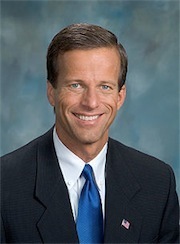
I can't think of any reason whatsoever why John Thune is considered a viable presidential candidate. There are literally dozens of other incumbent senate Republicans who, as best I can tell, are identical to Thune. Therefore, I take the fact that Thune is continually discussed as a potential presidential candidate to indicate that he has some crucial below the water line advantages in terms of support by shadowy elites. Under the circumstances, he ought to toss his hat in the ring and run.
But Manu Raju and Jonathan Martin suggest he's leaning against a bid. Jon Chait notes that Barack Obama's recent strong polling may be dissuading him: "Thune can pick when he wants to run for president, and running against a fairly popular incumbent president may not be the best time to pick."
In case Thune happens to be a reader of this blog, let me throw out there that this idea of picking your year doesn't make much sense. There's a ton of uncertainty inherent in any presidential campaign because the dynamics of primaries are very hard to predict, and because the underlying economic trends that weigh so heavily on general elections are also hard to predict. The only thing we really know about John Thune's prospects in 2012 is that for semi-mysterious reasons he's currently considered a more plausible candidate than Jon Kyl or Jim Risch or Roger Wicker or John Barrasso or Mike Johanns or any number of other unremarkable conventional conservative Republicans. Will this still be true in 2016? Nobody knows. Will Obama be popular in the fall of 2012? Nobody knows. Have Republicans waged a primary campaign, then lost, and gone on to have successful future political careers? Yes. The conclusion is clear—he should get in. Unless the issue is that he doesn't actually want to be president (understandable, in my view, though I would love the airplane) in which case he should shut the door on this.


Matthew Yglesias's Blog
- Matthew Yglesias's profile
- 72 followers



